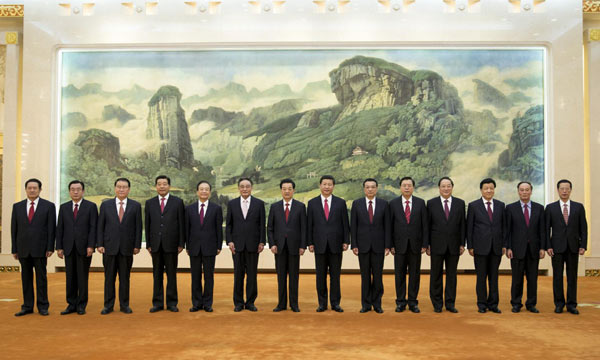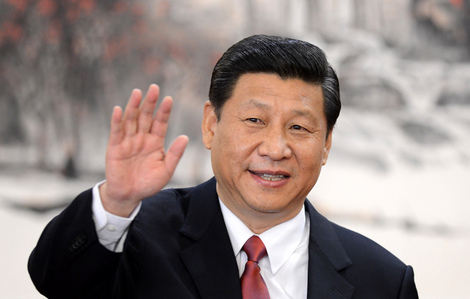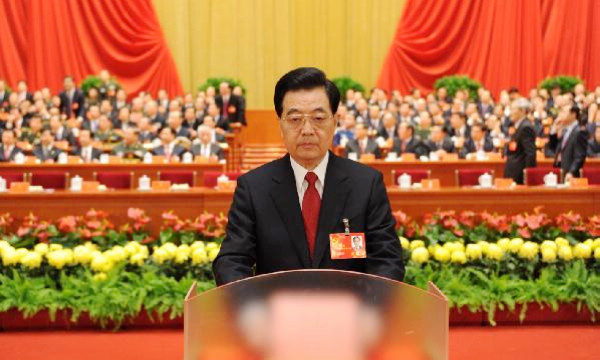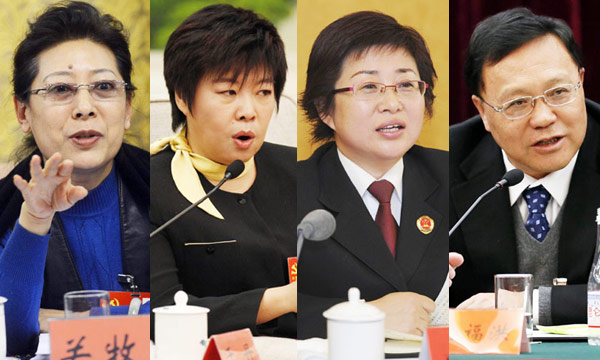Program to give 5m a new home
By An Baijie (China Daily)
Updated: 2012-11-13 07:47
Policies to cool real estate market to stay in place for now
More than 5 million low and middle-income families across China will get their feet on the first rung of the property ladder next year thanks to the government's affordable housing policy, Jiang Weixin, minister of housing and urban-rural development, said on Monday.
Jiang, who said that the policy "is proving to be effective in cooling down China's real estate market", added that the government's curbs on the property sector will not be relaxed in the near future.
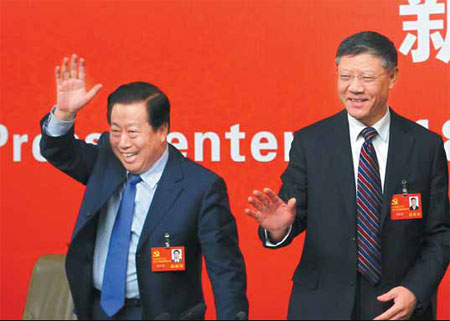 |
|
Jiang Weixin (right), minister of housing and urban-rural development, and Zhou Shengxian, minister of environmental protection, wave to reporters at a news conference during the Party congress in Beijing on Monday. Zou Hong / China Daily |
Speaking at a news conference on the sidelines of the 18th National Congress of the Communist Party of China alongside three other ministerial-level officials, he said the ministry has set the target of building "more than 5 million units" of affordable housing in 2013.
He added that the central government's target to build 7 million affordable homes this year had been achieved.
China started the affordable-housing program in 2008. In early 2011, the government pledged to build 36 million affordable homes by the end of the 12th Five-Year Plan (2011-15) period.
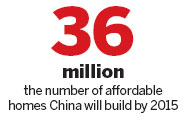
"Affordable homes can meet the demand of those families that are not rich and are willing to accept apartments with an area of less than 60 square meters," Jiang said.
Around 20 percent of the country's housing demand will be met by government-sponsored projects, while the remaining 80 percent will be met by market-oriented projects, he added.
The Chinese government has paid great attention to building affordable housing in recent years as part of its efforts to improve people's livelihoods amid rocketing property prices.
But even for China's Nobel literature laureate Mo Yan, buying an apartment in a big city such as Beijing can prove difficult.
Mo said in an interview in October that he planned to buy an apartment in Beijing with his $1.2 million prize money.
He said he initially hoped to buy a large apartment, but then found out that property prices in some parts of Beijing were as high as 50,000 yuan ($8,000) per square meter.
"So I can only afford a 120-square-meter apartment with the prize money," he said.
The government has taken a series of measures in recent years to rein in rapidly rising house prices, including restraining property speculation and investment-oriented housing purchases.
Jiang said that the measures are starting to bear fruit, and will not be altered in the near future.
By the end of 2011, the government had helped to provide housing to more than 26 million low and middle-income families, accounting for 11 percent of the nation's urban households, according to official figures.
The basic framework of the nation's housing policy has been formed, covering low-rent housing, public-rental housing, affordable housing, price-limited commodity housing and the renovation of substandard accommodation.
Job creation
During the news conference, Yang Zhiming, vice-minister of human resources and social security, said that the government will take measures to create more jobs.
The slowdown in the nation's economic growth has affected employment, with 4.1 percent of urban residents currently registered as unemployed, Yang said.
The creation of new employment has slowed since April, with 10.24 million jobs created from January to September.
In addition, 7 million students graduated from universities or colleges this year, piling more pressure on an employment market where a large number of migrant workers are also seeking jobs, he said.
To boost the nation's employment prospects, Yang said the government is going to encourage the development of labor-intensive industries.
Small and medium-sized enterprises are the main source of employment that the government is going to support, he said.
"President Hu Jintao said in his report to the Party congress that we should promote high-quality employment," he said.
"So we should take more effective measures."
The ministry is also taking steps to encourage entrepreneurship, by offering loans of up to 100,000 yuan to graduates starting their own businesses.
And to boost the employment prospects of migrant workers, human resources authorities across the nation will provide training courses for up to 6 million migrant workers annually, he said.
anbaijie@chinadaily.com.cn
Related Stories
Lawmakers warn on housing moves 2012-11-13 07:03
Affordable housing brings warmness to low-income group 2012-11-06 17:18
Tough measures, more housing supply are both needed 2012-11-03 06:14
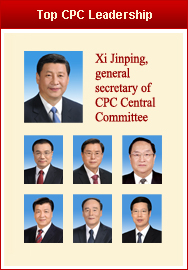
Top News
A new generation of leaders
Xi's address to the media
World welcomes China's leadership change
Video


